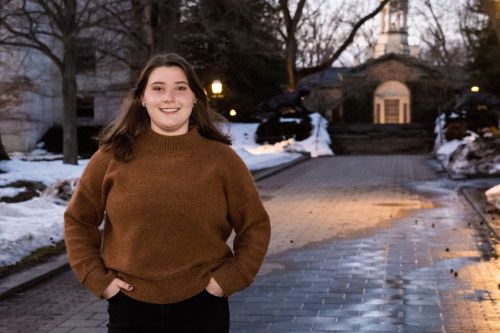
Two summers ago, Ava Goldinger veered off the usual mechanical engineering internship path and flew to Shanghai. It was only her second time on a plane, but she went halfway around the world to teach STEM to middle schoolers at a summer camp. Fueled by her passion for teaching young students science and technology, the journey epitomizes what Ava loves so much about robotics.
“Robotics is a fantastic tool to empower students and teach them so many skills that are important in the world,” says Ava, who is now a senior at Princeton. “To them, it seems like you are just explaining what a wrench does or how to code in Java, but you are also showing them how to brainstorm, work as a team, and speak publicly.” Ever since her first robotics club meeting, Ava has been passionate about STEM projects. In high school, she worked as a STEM summer camp counselor and helped pilot two LEGO League teams. Today, Ava is a senior at Princeton in MAE, receiving a certificate in Robotics and Intelligence Systems (RIS), and has special interests in CAD design, FEA, and project management. Last year, as part of the Princeton ProCES program that funds non-profit internships, she wrote fall STEM curriculum for the Boys and Girls Club of Western Pennsylvania.
“Robotics allows people to brainstorm their own ideas about how they can streamline their lives or make them better. There is no definitive blueprint,” explains Ava. “There is an incredible amount of technology that goes into building the robot and then programming it to be capable of completing a task. It is truly cutting edge—we continually see new technology coming out and barriers being broken.”
A New Web Learning Platform: Remodeling Robotics
Ava was inspired by the summer experiences. When it came time to select a thesis topic, she wanted to find a way to incorporate her concentration in RIS with her passion for STEM education. She decided to develop a robotics website for middle school students that teaches foundational robotics terminology, concepts, and lessons. The website, remodelingrobotics.org, will launch in May 2021.
“I was apprehensive at first, because the website was a bit unconventional for an MAE thesis, but I wanted to do it so badly that I charged ahead anyways,” she says. “Thanks to a conversation with my advisor about rounding out the content, it is going really well.”
“Ava is working on a project to democratize STEM education. Kids dream about robots. Her interests are to break down barriers for all students to explore robotics by reducing the costs and complexity of getting started,” says her advisor, Michael Littman, PhD, Professor of Mechanical and Aerospace Engineering at Princeton.
The website has three units that feature robotics: basics, building and coding a hobby robot, and lessons using the robot. The early lessons dive into the fundamentals of the field from understanding electricity and the basics of coding to explaining the components of the robot. Later material focuses on the assembly of the robot, learning how to write code, and eventually how to test the product. The content
also includes suggestions for materials and options to purchase different parts online. Ava’s goal in creating the site was for anyone to be able to teach themselves.
Whether it is in the classroom or an online format, Ava feels passionate about sharing her knowledge. As the oldest of four siblings, she is no stranger to leading and instructing a pack. “Robotics is an incredible field, but if you have no path into it, it is difficult to know where to start,” she explains. “My goal is to create something accessible, making all the written curriculum free online, and trying my best to keep the price point for materials really low.”
One of her favorite activities in high school was building robots for competition. Every year, her FIRST Robotics team would design a robot that participates in a game. Some of her favorite creations threw dodgeballs and frisbees or climbed structures.
“Seeing the kind of robots that were actually possible to create and learning from mentors that were engineers themselves inspired me to pursue the field at Princeton,” she says. “My best friend and I went to our first meeting in eighth grade and for the next five years, that is where we spent most of our time.”
In a memorable lesson at the summer camp in China, she guided the students in designing an urban plan for a theoretical Mars community. The students had to brainstorm everything the town needed from schools to houses and emergency services. After they developed the layout, the students built the community with MakerSpace materials.
“When it was time to break for lunch, they begged me for more time,” she recalls. “It wasn’t until Shanghai that I realized STEM was not just a hobby, it was something I was passionate about pursuing as a career.”
When Ava is not taking MAE classes, she enjoys learning about anthropology and religion. She served on the board for the Pace Council for Civic Values and is a member of the Princeton Quadrangle Club. During the pandemic she has kept busy dabbling in painting and knitting.
Ava experienced the profound difference a teacher can make in those early club sessions. After graduation, she hopes to continue to do the same for young students.
-- Carolyn Sayre